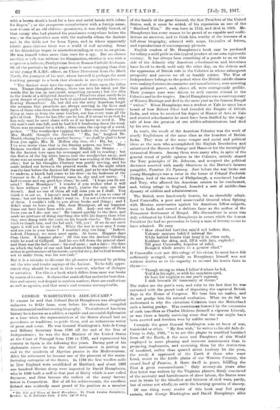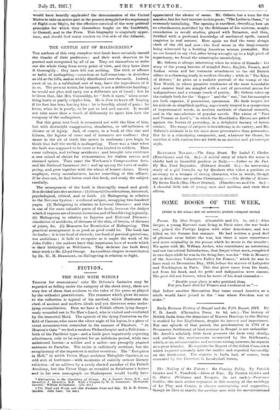GEORGE WASHINGTON'S AIDE-DE-CAMP.*
Iv cannot be mid that Colonel David Humphreys was altogether unknown to fickle fame, even before his descendant compiled this substantial and interesting biography. To students of American history he is known as a soldier, a capable and successful diplomatist at a time when the representatives of the States abroad had no precedents or traditions to guide them, and an industrious writer of prow and verse. He was General Washington's Aide-de-Camp and Military Secretary from 1780 till the end of tire War of Independence ; he was the first Minister of the United States at the Court. of Portugal from 1790 to 1797, and represented his country in Spain in the following five years. During part of his diplomatic career he was the chief instrument in putting an end to the misdeeds of Algerian pirates in the Mediterranean. After- his retirement he became one of the pioneers of the manu. factoring enterprise of the States. In 1788 the first woollen mills in New England were eatablighed at Hartford, and about 1603 Ma hundred Merino /sheep were imported by David Humphreys, who in 1806 built a mill in that part of Derby which is nor: rolled Seymour, and thus became the earliest of the many factory towns in Connecticut. But of all his achievements, the excellent Colonel was evidently most proud of his position as a member .eV Life test limn of Dore; Muuparrw. By Fronk Landon lluoubseys. Loudon: U. P. Putssois Sous. 2 cola. 1,740 ott.J of threfamily of the great General, the first President. of-the United States, and, it must be added, of- Iris reputation as ono of the " Hartford Wits." He wag born in 175:1, and diod. its 1818. Mr. Humphreys has every reason to be proud of so capable and multi. farioua an ancestor, and to think hirnavorthy of the =not= of a full-dress biography, adorned with maps, famine!es of letters, and reproductions of contemporary pictures.
English readers of Mr. Humphreys's book may be pardoned for taking a mild pride in this typical product of our own eighteenth century. It has always been something- of a puzzle to us on this side of the Atlantic why American sehoolmasters and historians have loved. to.dwell, until only the other day, on the defects and the oppression of British rule in the Colonies in whose subsequent prosperity and Boccess wo all so frankly rejoice. The War of Independence belongs to the period when the British middle eleoesea were making fortunes in commerce and manufacturea, were asserting their political power, and, above all, were coarageously prolific. Their younger sons were driven to seek careers abroad in tha Colonies and in the tropics. David Humphrey's was a contemporary of Warren Hastings and died in the same year as the famous Bengal- " writer." When Humphreys was a student nt Yale he most have heard of how Robert Clive had founded the Empire of British India, and when he received his degree of Master of Arta at Yato and started schoolmaster he must have been thrilled' by the tragic tato of how the greatest of our soldier-administratora had died by his own heard.
In truth, the revolt of the American Colonies was the work of sturdy Englishmen of the same class as the founders of British India. They were of the same temper and social and politicaL ideas as the men who accomplished the English Revolution- mut substituted the Houses of Orange and Hanover for the incorrigibly tyrannical Stuarts. Among thorn were. many who, in spite of the general trend of public opinion in the Colonies, entirely shared the Tory principles of Dr. Johnson-, and accepted the political doctrines asserted with manly bluntness in the Doctor's famous pamphlet, Taxation No Tyranny. Just before the war broke out young Humphreys was a tutor in the house of Colonel Frederick Philipae, lord of the manor of Philipsburgh, a convinced loyalist and Tory, who allowed his American estates to be contibeated, and, taking refuge in Englund, founded a sort of middleelasa dynasty of soldiers and athninistrators.
The British were bandaomely beaten, let us cheerfully admit. Lord Cornwallis, a poor and unsuccessful General when fighting with Hessian mercenaries against his American follow-subjects, went to Incite and earned a dubious fame as the author of the Permanent. Settlement of Bengal. His. discomfiture in arms was duly celebrated by Colonel Humphreys in verses which the honest President (he had no pretension to being a man of letters) scams to have admired. He sang "How cloud-hid hatt'rias rain'd red bullets dire, Volcanic mortars bolded infernal fire
While baleful bombs that buoy'd. in ether rode,
Emblaze the skim, and, fluid with fate, explode I Till groat Cornwallis, hopeless of relief, Resign'd whole armies to a greater chief."
If Cornwallis ever saw this eulogy of his victor, he must have felt sufficiently avenged, especially as Humphreys himself was not without doubts as to his rapacity to recount his hero's feats in rhyme :—
" Though strong as when I follow'd where he led, Toil'd in his sight, or with his mandates sped, Or bore his trophies to our passe supreme, I sink beneath th' immensity of theme."
The italics nro the poet's own, and refer to the fact that he was• entrusted with the proud task of depositing the captured British flags in the House of Congress. We bear him no malice, and- do not grudge him his natural exultation. 'What we do fait M understand is why the victorious. Colonists bore the Motherland such a lasting grudge. Was resontment-fostered by the conunonts of such travellers as Charles Diekons.(hirnself a vigorous Liberal), or was there a faintly surviving sense that the war might have been averted and freedom won by milder means ?
Certainly the great General Washington svas no lover of war, fratricidal or other. " My first wiah," he writes to his old Aideale- Camp in July, 1785, "-is to see this plague to mankind banished from off the Earth, & the sons and Daughters of this World employed in more pleasing and innocent amusements than in preparing implements, and exercising them for the destruction of mankind, rather than quarrel about territory let the poor, the needy & oppressed of the Earth & those who want Land, resort to the fertile plains of our Western Country, the second land of Promise, & there dwell in peace, fulfilling the First & great commandment." Only seventy-six years after that letter was written by the Virginian planter, firmly convinced- of the necessity and harmlessness of slave labour, the States were in twain by the bloodiest and bitterest of civil wars, partly, but of course not wholly, to settle the burning question of slavery. Of one- thing every reader of this book may feel pretty certain, that George Washington and David Humphreys alike avoild 'have .heartily applauded the determination .of the :United States to take an active part 112 the present struggle forthosupresnacy mf.ftight, over Mightafor the effective survival of the very.political _principles :for which they themselves fought 'on the -battlefield, dr, Counellaand in.the Press. This biography is-singularly oppor tune, and should find many readers on this side.of the. Atlantic.



























 Previous page
Previous page